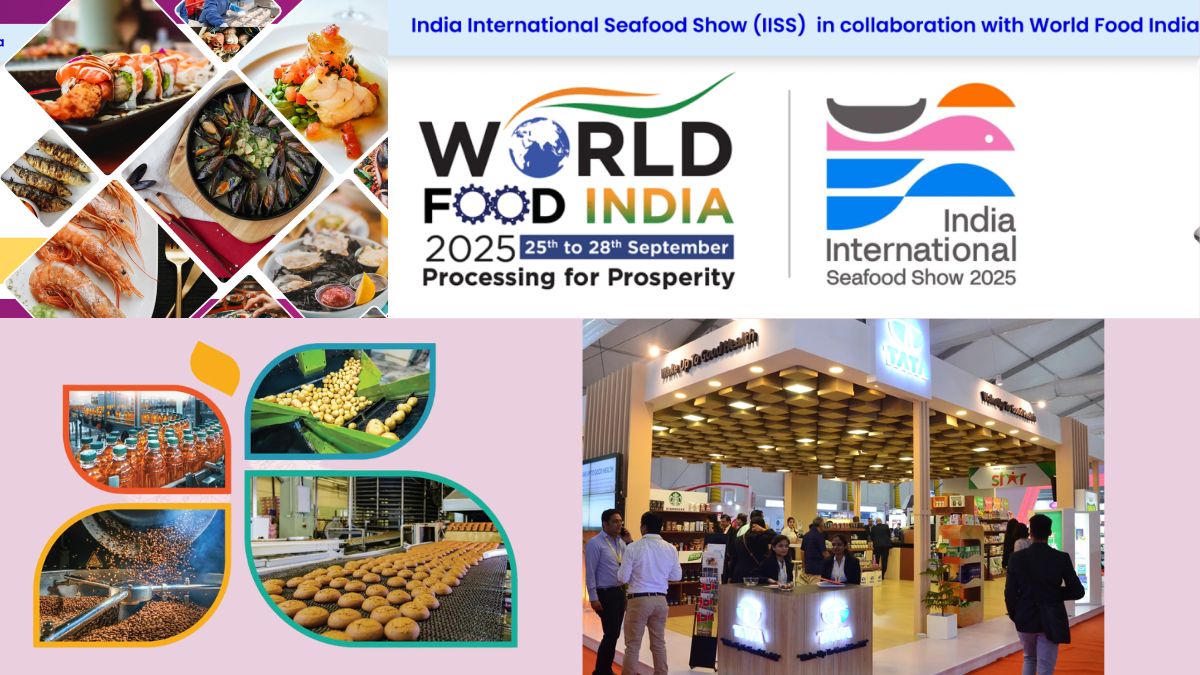Context:
The 4th edition of World Food India (WFI) is scheduled to take place from September 25 to 28, 2025, at Bharat Mandapam, New Delhi. This global food event aims to attract investments, showcase innovations, and highlight India's food processing potential.
Objectives:
1. Make India a Global Food Hub: Use India’s agricultural strengths and diversity to draw global investment and trade in food processing.
2. Empower MSMEs & Micro‑Entrepreneurs: Improve their access to technology, credit, and markets.
3. Promote Innovation & Sustainability: Showcase food technology, eco‑friendly packaging, cold chain solutions, and strategies to reduce food waste.
4. Connect the Full Food Ecosystem: Link all stakeholders — from farmers to exporters, processors to innovators.
5. Enhance Regulatory Standards: Enable global regulatory dialogue to improve food safety and export readiness.
About Food Processing Industry in India:
Food processing involves converting raw plant and animal products into edible, marketable food through processes such as cleaning, grading, milling, preservation, packaging, etc.
India’s Position & Key Contributions
· India’s Food Processing Industry is the 6th largest in the world.
· India ranks 2nd globally in fruits & vegetables production and 1st in dairy.
· The sector contributes ~ 9 % to Agriculture’s Gross Value Added (GVA) and ~ 23 % to India’s agricultural exports.
· It supports over 7 million jobs across the value chain (both directly & indirectly).
Growth enabler for food processing industry in India:
1. Changing Lifestyles & Demographics
o With ~ 65 % of Indians aged under 35, rising incomes, urbanisation, and busier lives, demand for processed and ready‑to‑eat foods is growing.
2. Abundant Raw Material Base
o India leads in milk, banana, mango, ginger production, and is among the top producers of rice, wheat, fruits & vegetables — ensuring year‑round inputs.
3. Technological Advancement & Digitalisation
o Use of AI, IoT, satellite monitoring, smart supply chains reduces waste, improves traceability, and streamlines farm-to-fork integration.
4. Logistics & Market Access
o Organised retail, e-commerce, cold chain networks, and efficient last-mile delivery expand domestic markets. Exports of processed foods have been growing at ~ 11.74 % CAGR, reaching ~$ 16.2 billion.
5. Policy & Investment Incentives
o Schemes like PLI (Production Linked Incentive) and liberal FDI (100 % under automatic route) attract global players to invest in the sector.
Key Challenges That Must Be Addressed:
1. Fragmented Supply Chain
o ~ 86 % of farmers are small or marginal, making aggregation hard.
o Farmers often receive only 30–35 % of the final value (versus 65–70 % in developed countries).
2. Infrastructure Gaps & Food Losses
o Due to inadequate cold chains and storage, India loses ~ ₹92,651 crore annually.
o 25–30 % of fruits & vegetables spoil post-harvest.
3. Regulatory Complexity
o Multiple regulatory bodies and lack of single-window clearance lead to delays & compliance costs, especially for MSMEs.
4. Skill & Quality Constraints
o Only ~ 3 % of the food processing workforce is formally trained.
o Export rejections due to inconsistent standards: between 2020–24, 527 processed food items from India were flagged by the EU.
Government Initiatives & Reforms:
· PM Kisan SAMPADA Scheme: Enhance infrastructure, reduce waste, boost exports.
· PMFME Scheme: Formalise micro food processing units and SHGs.
· Special Food Processing Fund: ₹2,000 crore via NABARD for infrastructure & supply chain projects.
· PLI Scheme for Food Processing: Incentivise investment in food & cold chain infrastructure.
· Mega Food Park Scheme: Create integrated processing + storage hubs.
· National Makhana Board: To promote Indian superfoods globally.
Conclusion:
World Food India 2025 is a significant step towards establishing India as a global food processing powerhouse. With its comprehensive policy framework, international partnerships, and focus on sustainability and innovation, the event is poised to drive India's food processing industry toward global competitiveness. By fostering collaboration, investment, and knowledge exchange, WFI 2025 will play a crucial role in shaping India's food future and contributing to the country's vision of becoming a developed, inclusive, and globally competitive nation.







